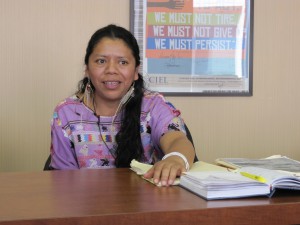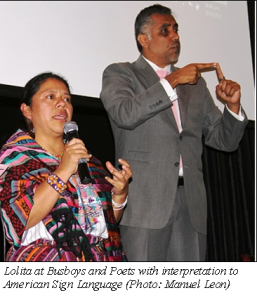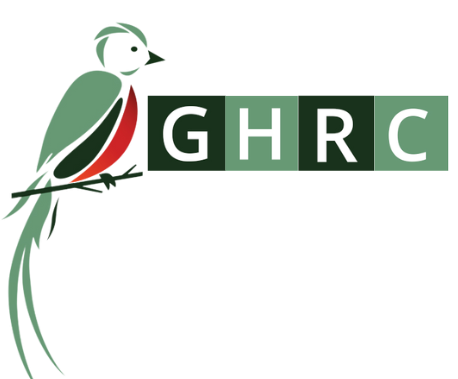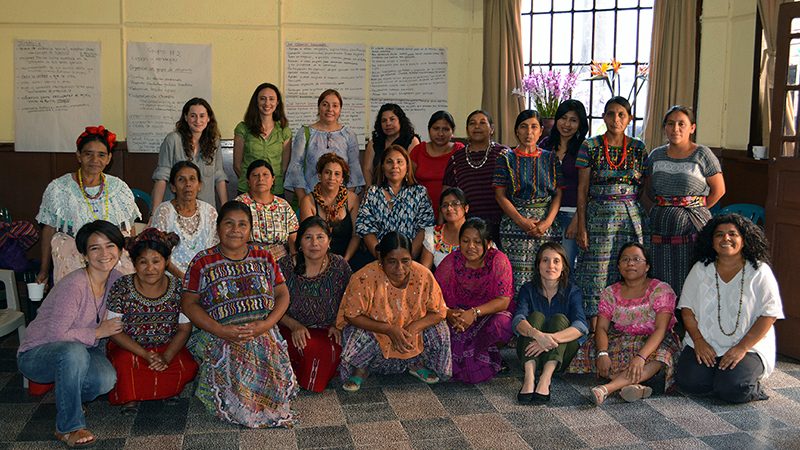Published in El Quetzal Issue 14, May 2013
Lolita Chávez Ixcaquic returned to her home in Santa Cruz del Quiché after a month-long tour of Canada and Washington, DC, where she spoke about her experience as a community leader working to defend the rights of the K’iche’ people. Lolita served as spokesperson for the K’iche’ People’s Council (CPK) and has proven herself a fearless warrior of peaceful resistance to the many large-scale hydroelectric and mining projects in the region of El Quiché. GHRC organized the DC leg of Lolita’s tour, which included public events at universities as well as meetings with several government offices.
 Lolita and the CPK have organized a number of community referendums in which nearly 100% of 27,000 participants expressed their opposition to mining and hydroelectric projects in their territories. Over a million Guatemalans have participated in these referendums throughout the country and an overwhelming majority has rejected the projects. “Our movements are based on ancestral principles of equilibrium and reciprocity,” she explained. “They are intergenerational, promote respect for Mother Nature and all living things.”
Lolita and the CPK have organized a number of community referendums in which nearly 100% of 27,000 participants expressed their opposition to mining and hydroelectric projects in their territories. Over a million Guatemalans have participated in these referendums throughout the country and an overwhelming majority has rejected the projects. “Our movements are based on ancestral principles of equilibrium and reciprocity,” she explained. “They are intergenerational, promote respect for Mother Nature and all living things.”
The Guatemalan government, however, refuses to recognize the legitimacy of the referendums and continues to deny indigenous peoples’ right to consultation.
Lolita identified the government as only one of a trio of power-holders — including the country’s oligarchy and the international business community — that has worked to undermine and repress the movements of resistance to extractive industries and other megaprojects. They accuse community activists of being “trouble-makers, savages, and enemies of development who scare away tourism.”
Companies take advantage of impunity to take over indigenous lands, she explained, and investors often have no idea where their money goes. “Their investments bring them development, food, wellbeing, clean and orderly societies…but at what cost? Gold is killing us. This relationship is unjust; you can’t generate gold by spilling blood.”
The work of the CPK has implied serious security risks for Lolita and her colleagues, who have been the victims of vicious attacks, both verbal and physical. There exists an alarming impunity rate for the perpetrators of these attacks and a simultaneous criminalization of the human rights defenders themselves. Many have been charged with baseless — but very serious — criminal offenses. As the public face of the Council for the last two years, Lolita has been a primary target and has been named in 22 legal complaints; the local police have also labeled her a threat to national security and the Constitution – essentially classifying her as a terrorist.
One of the most emotional and poignant moments in Lolita’s presentations was when she told the story of a fellow CPK leader, José Tavico Tzunun, who was murdered in his home on June 12, 2012. He had received death threats, but did not go to the police because he had no faith in the justice system.
The Inter-American Commission on Human Rights granted Lolita precautionary measures that provide her with a bodyguard. But, even with increased security, she has been victim to attack. She spoke of an incident that occurred in July of 2012 when a group of armed men surrounded the bus that was carrying her home from a protest and attempted to lynch her. The men were unable to drag her from the bus, but severely beat four other women who were with her.
The frequency of attacks against members of the CPK has risen significantly over the past year. In 2010 there were four documented attacks against the CPK; in 2011 there were eight. In 2012, that number jumped to 67.
Lolita attributes this dramatic increase to the presidency of Otto Pérez Molina. “We are being killed in the name of development and in the name of security,” she said, “but we are not terrorists or drug traffickers.”
Yet, she emphasized, they are responding to the new war waged against their land, territories and culture with peaceful actions. “While I am still alive, I will continue to speak out; I will not be silenced. I will continue saying no to remilitarization, no to repression.”
Lolita’s decision to fight for her community’s rights in spite of ongoing risks speaks to her incredible courage, selflessness and conviction. And in the end, Lolita’s message is one of peace and justice. She wants nothing more for her community than the basic rights of consultation, self-determination, and something the Mayan K’iche’ call ‘Utz Kaslemal,’ the right to live a full and harmonious life.


